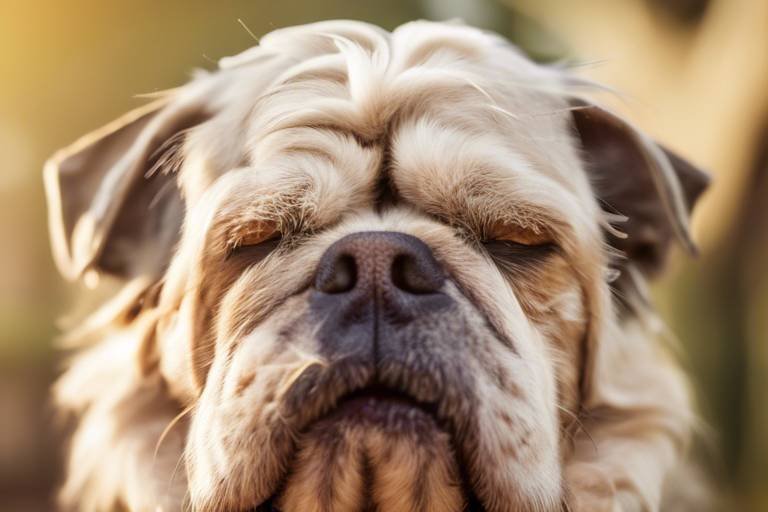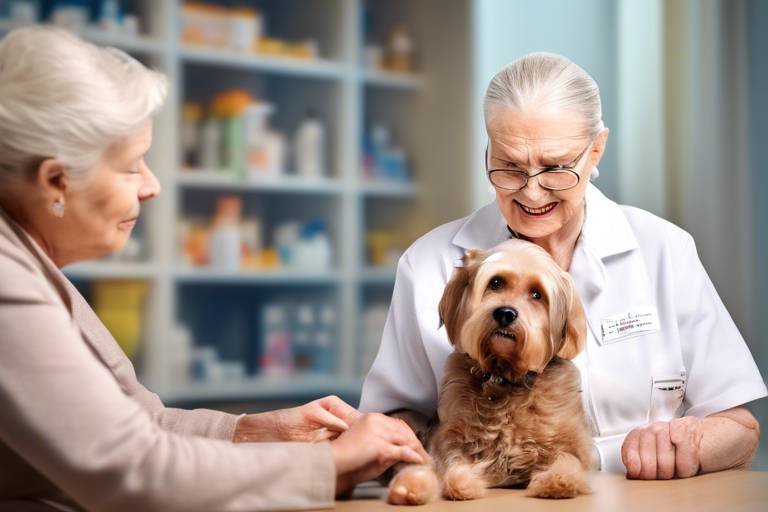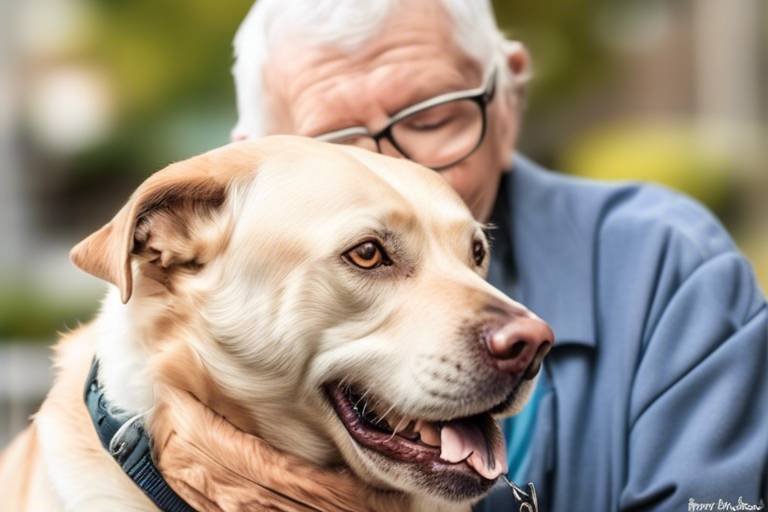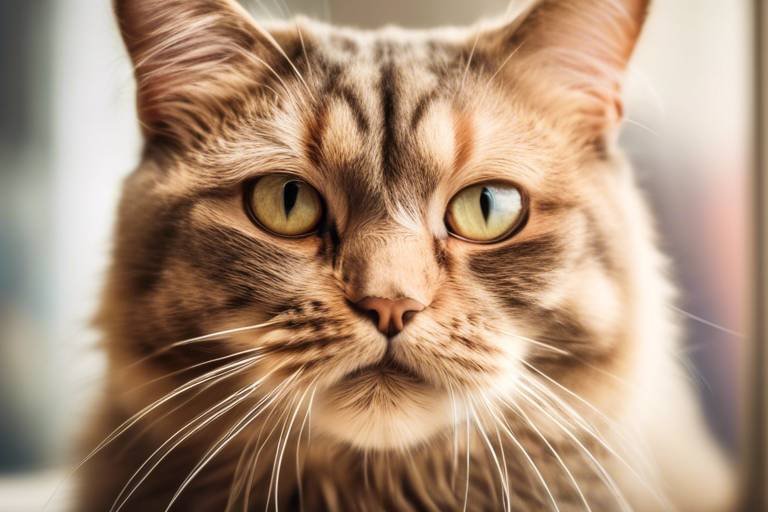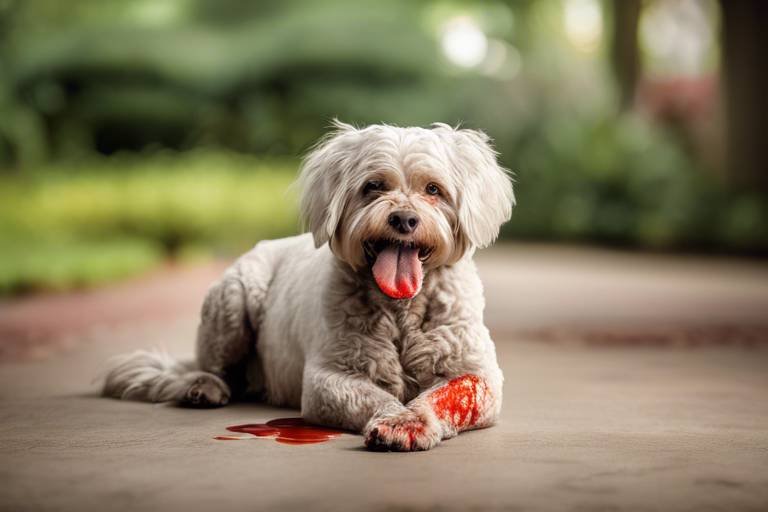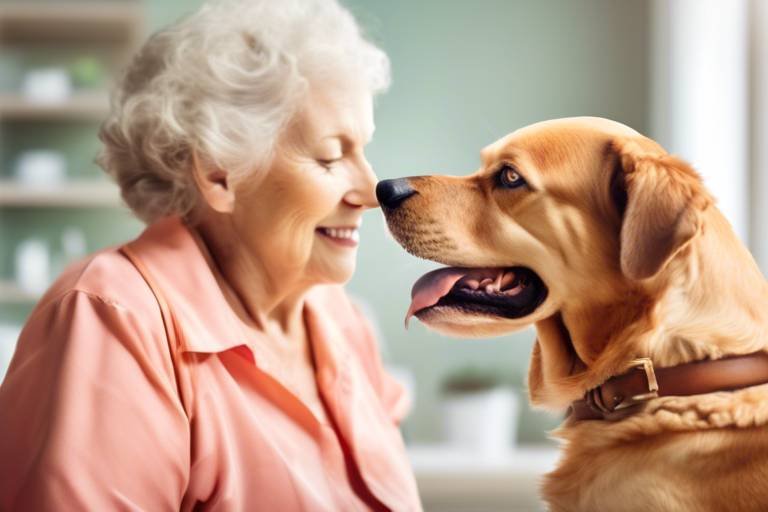The Benefits of Acupuncture for Older Pets
As our furry friends age, they often face a myriad of health challenges that can significantly affect their quality of life. It’s not just about keeping them comfortable; it’s about enhancing their overall well-being. One increasingly popular method that pet owners are turning to is acupuncture. This ancient practice, rooted in Traditional Chinese Medicine, offers a range of benefits that can help older pets live happier, healthier lives. But what exactly does acupuncture involve, and how can it make a difference for your beloved companion? Let’s dive deeper into the world of acupuncture and explore its remarkable advantages for older pets.
Acupuncture is a holistic treatment that involves inserting thin needles into specific points on the body. These points correspond to energy pathways, or meridians, which are believed to influence the body’s ability to heal itself. For older pets, acupuncture can be a game changer. It not only promotes healing but also helps to restore balance within the body. Imagine it as a gentle nudge that encourages your pet’s natural healing processes to kick into high gear. This non-invasive therapy can be particularly beneficial for pets dealing with chronic conditions, making it a valuable addition to their healthcare regimen.
As pets age, just like humans, they become more susceptible to various health issues. Common ailments include arthritis, mobility problems, and chronic pain. Recognizing these issues is crucial for pet owners who want to ensure their furry friends maintain a good quality of life. For instance, arthritis can lead to debilitating pain, making it difficult for pets to engage in their favorite activities, such as playing or going for walks. Understanding these health challenges can help you take proactive steps to improve your pet’s comfort and happiness.
Arthritis is one of the most prevalent conditions in older pets, often leading to discomfort and reduced mobility. Imagine how frustrating it must be for your pet to want to play but be unable to due to pain. Acupuncture can help alleviate this pain and inflammation, allowing pets to regain their mobility and enjoy life to the fullest. By targeting specific acupuncture points, this therapy can effectively reduce the discomfort associated with arthritis and improve overall joint function.
It’s essential to recognize the signs of arthritis in your pet. Common symptoms include:
- Limping or favoring a particular leg
- Stiffness, especially after resting
- Reluctance to engage in physical activities
- Difficulty climbing stairs or jumping
Understanding these signs can help you seek timely acupuncture treatment, ensuring your furry friend receives the care they need to thrive.
When it comes to treating arthritis, specific acupuncture techniques can be particularly effective. Techniques such as electro-acupuncture and trigger point therapy target the affected areas directly, providing relief and improving joint function. Electro-acupuncture involves using a small electrical current to enhance the effects of acupuncture, while trigger point therapy focuses on alleviating muscle tension. These methods can be tailored to meet the unique needs of your pet, offering a customized approach to pain management.
Beyond pain relief, acupuncture can significantly enhance mobility and flexibility in older pets. Regular sessions can lead to improved physical function, allowing your furry companion to enjoy a more active lifestyle. Think of acupuncture as a tune-up for your pet’s body, helping to keep everything running smoothly. With increased mobility, pets can engage in activities they love, from playing fetch to simply enjoying a stroll around the park.
The benefits of acupuncture for older pets extend far beyond just relieving pain. This holistic approach can enhance overall well-being, boost energy levels, and improve mental health. Imagine a pet that not only feels better physically but is also more cheerful and active! Regular acupuncture sessions can lead to a happier, healthier pet, making it a worthwhile investment in their care.
Acupuncture has a calming effect on pets, helping to reduce stress and anxiety. This is especially beneficial for older pets who may experience anxiety due to changes in their environment or health. Picture your pet relaxing comfortably, free from the worries that often accompany aging. This stress reduction can lead to a more peaceful life, allowing your pet to enjoy their golden years to the fullest.
Another significant benefit of regular acupuncture sessions is the stimulation of the immune system. A stronger immune response means that older pets can fight off illnesses more effectively. Think of acupuncture as a booster shot for your pet's health, helping them to stay stronger and healthier as they age. This enhanced immune function not only contributes to better overall health but can also lead to increased longevity, allowing you to cherish more moments with your furry friend.
1. Is acupuncture safe for older pets?
Yes, acupuncture is generally safe for older pets when performed by a qualified veterinarian. It’s a non-invasive treatment that can provide significant benefits.
2. How many sessions will my pet need?
The number of sessions varies depending on your pet's specific condition. Your veterinarian can provide a personalized treatment plan based on your pet's needs.
3. Will my pet feel pain during acupuncture?
Most pets experience minimal discomfort during acupuncture. The needles used are very thin, and many pets relax during the treatment.
4. Can acupuncture be used alongside other treatments?
Absolutely! Acupuncture can complement other treatments, such as medication and physical therapy, to provide a comprehensive approach to your pet's health.

Understanding Acupuncture
This article explores how acupuncture can enhance the health and well-being of older pets, detailing its benefits, techniques, and considerations for pet owners looking to improve their furry companions' quality of life.
Acupuncture is an ancient practice rooted in Traditional Chinese Medicine (TCM) that has gained popularity in modern veterinary care. The technique involves inserting thin needles into specific points on the body, known as acupoints, to promote healing and restore balance. For older pets, who often face a myriad of health challenges, acupuncture can be a game-changer. It’s not just about sticking needles in; it’s about creating a pathway for the body to heal itself.
Imagine your pet's body as a complex highway system. Just like traffic jams can cause delays and frustration, blockages in energy flow can lead to discomfort and pain. Acupuncture helps to clear these blockages, allowing for smoother traffic and improved overall function. This ancient practice is particularly beneficial for older pets who may be dealing with chronic conditions or age-related ailments.
During an acupuncture session, a veterinarian trained in this method will assess your pet’s specific needs. They will identify the acupoints that correspond to your pet's ailments and insert needles that are typically very fine, causing minimal discomfort. Many pets find the experience relaxing, often lying down comfortably during the treatment.
While acupuncture is often used to alleviate pain, its benefits extend far beyond that. It can help:
- Enhance circulation
- Reduce inflammation
- Stimulate the nervous system
- Boost the immune system
- Improve overall well-being
In essence, acupuncture is a holistic approach that addresses not just the symptoms but the underlying issues affecting your pet's health. By understanding how acupuncture works, pet owners can make informed decisions about incorporating this therapy into their older pets' care regimen.
As pets age, they often experience a range of health problems, including arthritis, mobility issues, and chronic pain. Recognizing these common ailments is crucial for pet owners seeking effective treatment options to improve their pets' lives.
Arthritis is prevalent among older pets, leading to discomfort and reduced mobility. Acupuncture can alleviate pain and inflammation, helping pets regain their mobility and enjoy a better quality of life.
Common symptoms of arthritis in pets include limping, stiffness, and reluctance to engage in physical activities. Understanding these signs can help pet owners seek timely acupuncture treatment for their furry friends.
Specific acupuncture techniques, such as electro-acupuncture and trigger point therapy, can be employed to target affected areas, providing relief and improving joint function in arthritic pets.
Acupuncture not only addresses pain but also enhances mobility and flexibility in older pets. Regular sessions can lead to improved physical function and a more active lifestyle for aging companions.
The benefits of acupuncture for older pets extend beyond pain relief. This holistic approach can enhance overall well-being, boost energy levels, and improve mental health, leading to a happier, healthier pet.
Acupuncture has a calming effect on pets, reducing stress and anxiety. This is especially beneficial for older pets who may experience anxiety due to changes in their environment or health.
Regular acupuncture sessions can stimulate the immune system, helping older pets fight off illnesses more effectively. A stronger immune response contributes to better overall health and longevity.
Here are some common questions pet owners have about acupuncture for older pets:
- Is acupuncture safe for my pet? Yes, when performed by a qualified veterinarian, acupuncture is safe for pets of all ages.
- How long does an acupuncture session last? Sessions typically last between 20 to 30 minutes, depending on your pet's specific needs.
- How many sessions will my pet need? The number of sessions varies based on the individual pet and their condition, but many see improvements within a few treatments.
- Will my pet feel pain during the treatment? Most pets experience minimal discomfort; many find the treatment relaxing.

Common Health Issues in Older Pets
As our beloved furry companions age, they often face a myriad of health challenges that can significantly impact their quality of life. Recognizing these common health issues is crucial for pet owners who want to provide the best care possible. Older pets frequently experience ailments such as arthritis, mobility issues, and chronic pain. These conditions not only affect their physical well-being but can also take a toll on their mental health, making it essential for pet owners to stay vigilant.
One of the most prevalent issues is arthritis, which is essentially inflammation of the joints. This condition can lead to discomfort and a noticeable decline in mobility. Imagine how frustrating it must be for a once-active dog to struggle with simple tasks like getting up from a cozy spot or climbing stairs. The pain associated with arthritis can make them reluctant to engage in physical activities they once enjoyed, leading to a cycle of inactivity and further health decline.
Aside from arthritis, older pets may also suffer from dentistry issues. As pets age, their dental health can deteriorate, leading to painful infections and tooth loss. This can make eating difficult, which may result in weight loss and nutritional deficiencies. Keeping an eye on your pet's dental hygiene becomes increasingly important as they grow older.
Another common concern is obesity. It's easy for pets to gain weight as they become less active, and this excess weight can exacerbate existing health problems like arthritis and heart disease. A healthy diet and regular exercise are key to preventing obesity in older pets. However, it can be challenging to motivate an aging pet to stay active, especially if they are already dealing with pain.
Lastly, older pets are also more susceptible to chronic diseases such as kidney disease, diabetes, and even cancer. These conditions often require ongoing treatment and can be emotionally taxing for both pets and their owners. Regular veterinary check-ups become essential for early detection and management of these diseases.
In summary, as pets age, they can face a variety of health issues that require attentive care and proactive treatment. By understanding these common ailments, pet owners can seek effective treatments, including acupuncture, which can greatly enhance their pets' quality of life.
- What are the signs that my older pet may need acupuncture? Look for symptoms such as limping, stiffness, reluctance to play, or signs of pain when touched.
- How often should my older pet receive acupuncture? This can vary based on individual health needs, but many practitioners recommend weekly sessions initially, tapering off as improvement is seen.
- Is acupuncture safe for all older pets? While acupuncture is generally safe, it’s essential to consult your veterinarian to ensure it’s appropriate for your pet's specific health conditions.
- Can acupuncture replace traditional veterinary care? No, acupuncture should be used as a complementary treatment alongside traditional veterinary care for optimal results.
Arthritis and Joint Pain
Arthritis is a common ailment that affects many older pets, leading to discomfort and a significant decline in their overall quality of life. Imagine your furry friend, once full of energy and enthusiasm, now struggling to climb stairs or chase after their favorite toy. This heartbreaking transformation is often due to arthritis, which can manifest in various forms, including osteoarthritis and rheumatoid arthritis. The pain and stiffness associated with these conditions can be debilitating, making it crucial for pet owners to recognize the signs and seek appropriate treatment.
One of the primary challenges with arthritis is that it can be difficult to detect in pets. Unlike humans, pets can’t vocalize their discomfort or pain, so it’s essential for pet owners to be vigilant. Common symptoms include:
- Limping: A noticeable change in gait can indicate joint pain.
- Stiffness: Pets may have trouble getting up after lying down or may take longer to move around.
- Reluctance to Exercise: If your pet suddenly shows less interest in walks or playtime, it may be due to pain.
- Behavioral Changes: Increased irritability or hiding can also be signs of discomfort.
Recognizing these symptoms early on can make a world of difference in your pet's treatment journey. Acupuncture offers a holistic approach to managing arthritis and joint pain, acting as a complementary therapy alongside traditional treatments. By inserting thin needles into specific acupuncture points, this ancient practice stimulates the body’s natural healing processes. It enhances blood circulation, reduces inflammation, and promotes the release of endorphins, which are natural pain relievers.
There are specific acupuncture techniques that can be particularly effective for pets suffering from arthritis:
| Technique | Description |
|---|---|
| Electro-Acupuncture | This technique involves applying a small electrical current to the acupuncture needles, enhancing the therapeutic effects on painful joints. |
| Trigger Point Therapy | Focusing on specific trigger points associated with muscle tension can relieve pain and improve mobility. |
Regular acupuncture sessions can lead to significant improvements in joint function and mobility for arthritic pets. The cumulative effect of these treatments can help reduce pain levels, allowing your furry companion to regain their zest for life. Imagine seeing your pet playing again, running around with joy, and enjoying their daily walks without the burden of pain. That’s the magic of acupuncture!
In conclusion, if your older pet is showing signs of arthritis or joint pain, consider discussing acupuncture with your veterinarian. It can be a game-changer in enhancing their comfort and overall quality of life. Remember, a happy pet means a happy home!
1. Is acupuncture safe for older pets?
Yes, acupuncture is generally safe for older pets when performed by a qualified veterinarian. It’s a non-invasive treatment that can provide significant relief.
2. How many sessions will my pet need?
The number of sessions varies depending on the severity of the condition. Many pets benefit from weekly sessions initially, which may be reduced as their condition improves.
3. Will my pet feel pain during the treatment?
Most pets experience little to no discomfort during acupuncture. The needles used are very thin, and many pets relax during the session.
4. Can acupuncture be used alongside other treatments?
Absolutely! Acupuncture is often used in conjunction with other therapies, such as medication or physical therapy, to enhance overall treatment efficacy.
Symptoms of Arthritis
As our beloved pets age, it’s not uncommon for them to develop arthritis, a condition that can significantly impact their quality of life. Recognizing the is crucial for pet owners who want to provide timely and effective care. One of the most noticeable signs is limping, which often becomes more apparent after periods of rest or when your pet first gets up from a lying position. This limping can be subtle at first, perhaps just a slight favoring of one leg, but it can progress over time.
Another common symptom is stiffness, particularly after your pet has been inactive for a while. You might notice that your furry friend takes longer to get up or seems to struggle with movements that were once effortless, like jumping onto the couch or climbing stairs. This stiffness can be exacerbated by cold weather, making those chilly mornings particularly tough for older pets.
Additionally, many pets with arthritis show a reluctance to engage in physical activities that they once loved. Whether it’s playing fetch or going for walks, your pet might seem less enthusiastic or even avoid these activities altogether. This change in behavior can be heartbreaking, as it’s often a clear indicator of discomfort. Some pets may even exhibit behavioral changes, such as increased irritability or withdrawal, which can signal that they’re in pain.
To help you identify these symptoms more effectively, here’s a brief overview of the key signs to watch for:
- Limping: Favoring one leg or showing signs of pain while walking.
- Stiffness: Difficulty getting up or moving, especially after resting.
- Reduced Activity: Less interest in playtime or walks.
- Behavioral Changes: Increased irritability or withdrawal from social interactions.
Understanding these symptoms is essential, as they can guide you in seeking appropriate treatment options, such as acupuncture, which can alleviate pain and improve your pet's overall well-being. If you notice any of these signs, it’s important to consult with your veterinarian to discuss the best course of action for your furry friend.
Q: How can I tell if my pet is in pain?
A: Look for changes in behavior such as reluctance to move, changes in appetite, or vocalizations that indicate discomfort. If your pet seems more irritable or withdrawn, these can also be signs of pain.
Q: Is acupuncture safe for older pets?
A: Yes, acupuncture is generally considered safe for older pets. It is a non-invasive treatment that can help manage pain and improve mobility without the side effects associated with some medications.
Q: How long does it take to see results from acupuncture?
A: Many pet owners report seeing improvements after just a few sessions, but the timeline can vary depending on the individual pet and the severity of their condition.
Q: Can I combine acupuncture with other treatments?
A: Absolutely! Acupuncture can complement other treatments, including medications and physical therapy, to provide a holistic approach to your pet's health.
Acupuncture Techniques for Arthritis
When it comes to treating arthritis in older pets, acupuncture offers a variety of techniques that can significantly improve their quality of life. One of the most effective methods is electro-acupuncture, which involves the application of a small electrical current to the acupuncture needles. This technique enhances the stimulation of acupuncture points, leading to increased blood flow and pain relief. Imagine it like giving your pet a gentle massage from the inside out, targeting the very areas that are causing discomfort.
Another valuable technique is trigger point therapy. This method focuses on specific tight areas within the muscles, often referred to as "knots." By inserting needles into these trigger points, the therapist can release tension and alleviate pain. It's akin to unraveling a tangled ball of yarn, allowing your pet's muscles to relax and function more freely. Many pet owners report that their furry companions seem to move with more ease after just a few sessions of this targeted approach.
Moreover, auricular acupuncture is gaining popularity among veterinarians. This technique focuses on the ear's acupuncture points, which are believed to correspond with various body parts. It's a less invasive option that can be particularly appealing for pets who may be anxious about traditional needle insertion. Think of it as a gentle reminder for your pet’s body to heal itself, creating a sense of balance and harmony.
Lastly, combining acupuncture with herbal therapy can enhance the overall treatment plan. Some veterinarians recommend specific herbal supplements alongside acupuncture to further reduce inflammation and improve joint health. This holistic approach ensures that your pet receives comprehensive care tailored to their unique needs. After all, every pet is different, and their treatment should reflect that individuality.
In conclusion, the various acupuncture techniques available for treating arthritis in older pets provide a multifaceted approach to pain relief and improved mobility. By understanding these methods, pet owners can make informed decisions about their furry friends' health, ensuring they live their golden years with comfort and joy.
- How many acupuncture sessions does my pet need? - The number of sessions can vary based on your pet's specific condition, but many pets benefit from a series of treatments followed by maintenance sessions.
- Is acupuncture safe for all pets? - Generally, acupuncture is safe for most pets. However, it's essential to consult with a veterinarian experienced in acupuncture to determine if it's suitable for your furry friend.
- Will my pet feel pain during the treatment? - Most pets experience little to no discomfort during acupuncture. The needles used are very thin, and many pets relax during the session.
- How do I find a qualified veterinarian for acupuncture? - Look for veterinarians certified in veterinary acupuncture; they often have specialized training and experience in this holistic therapy.
Improving Mobility and Flexibility
As our furry friends age, their bodies can become less agile, leading to a decline in mobility and flexibility. This is where acupuncture shines as a remarkable therapeutic option. By targeting specific points in the body, acupuncture not only alleviates pain but also promotes a greater range of motion. Imagine your pet as an aging athlete; just like a retired sports star, they may need a little extra help to stay in the game. Regular acupuncture sessions can serve as that much-needed boost, helping them regain their youthful exuberance.
One of the key aspects of acupuncture is its ability to stimulate blood circulation. Improved blood flow can lead to enhanced nutrient delivery to the muscles and joints, which is essential for maintaining flexibility. Think of it as watering a wilting plant; with proper hydration, it can flourish again. Similarly, when older pets receive acupuncture, their bodies can become revitalized, allowing them to move more freely and comfortably.
Moreover, acupuncture can help release endorphins—nature's painkillers. This not only provides immediate relief but can also encourage pets to engage in light activities, which further contributes to their mobility. Picture this: your older dog, once reluctant to chase a ball, suddenly finds the energy to trot after it again. It's a heartwarming sight, and it can be achieved through consistent acupuncture treatments.
It's also important to note that acupuncture is a holistic approach. While it addresses physical ailments, it also considers emotional well-being. Stress and anxiety can significantly impact a pet's willingness to move around. By incorporating acupuncture into their routine, pet owners can help reduce stress levels, leading to a more relaxed and active pet. This dual benefit of physical and emotional improvement makes acupuncture a comprehensive solution for enhancing mobility and flexibility.
In conclusion, if you're looking to help your older pet regain their mobility and flexibility, acupuncture could be the answer. Regular sessions can lead to noticeable improvements, allowing your furry companion to enjoy life to the fullest. Just like a gentle nudge towards a healthier lifestyle, acupuncture can transform your pet’s quality of life, making those tail-wagging moments even more special.
- How many acupuncture sessions does my pet need? The number of sessions can vary based on your pet's specific condition and overall health. Typically, a series of treatments is recommended for the best results.
- Is acupuncture safe for all pets? Yes, acupuncture is generally safe for most pets, including dogs and cats. However, it’s essential to consult with a veterinarian who specializes in acupuncture.
- What should I expect during an acupuncture session? During a session, your pet will be relaxed, and the veterinarian will insert thin needles into specific points. Most pets feel little to no discomfort, and many enjoy the experience.
- Are there any side effects? Side effects are rare, but some pets may experience mild fatigue after a session. This is usually temporary and a sign that the body is healing.
- Can acupuncture be used alongside other treatments? Absolutely! Acupuncture can complement other treatments, including medication and physical therapy, providing a holistic approach to your pet's health.

Benefits of Acupuncture for Older Pets
When it comes to our furry companions, especially as they age, we all want to ensure they lead happy and fulfilling lives. One of the most intriguing and effective methods to achieve this is through acupuncture. This ancient practice is not just for humans; it can work wonders for older pets, too! Imagine your beloved dog or cat, who once bounded around the house with energy, now struggling to get up or move around comfortably. Acupuncture can be a game-changer, revitalizing their spirit and improving their overall health.
The benefits of acupuncture for older pets extend far beyond simple pain relief. It’s a holistic approach that can enhance their quality of life in numerous ways. For instance, acupuncture can help alleviate chronic pain, particularly from conditions like arthritis, which is all too common in older animals. By targeting specific points in their body, acupuncture helps to reduce inflammation and promote healing, allowing your pet to move more freely and comfortably.
Additionally, acupuncture can significantly improve mobility and flexibility. Many older pets experience stiffness in their joints, which can make even the simplest activities, like climbing stairs or playing fetch, a daunting task. Regular acupuncture sessions can loosen tight muscles and improve joint function, encouraging your pet to engage in more physical activities and enjoy their golden years to the fullest.
But that’s not all! Acupuncture also plays a vital role in stress reduction. Just like us, pets can experience anxiety, particularly as they age and face various health challenges. The calming effects of acupuncture can help soothe their nerves, making them feel more relaxed and at ease. This is particularly beneficial for pets who may be anxious about vet visits or changes in their environment. A relaxed pet is a happy pet!
Moreover, acupuncture has been shown to enhance immune function. As our pets grow older, their immune systems may not be as robust as they once were. Regular acupuncture treatments can stimulate their immune response, enabling them to fend off illnesses more effectively. This is crucial for maintaining their health and longevity, allowing them to enjoy more years of companionship with us.
In summary, the benefits of acupuncture for older pets are extensive and multi-faceted. Not only does it provide pain relief, but it also enhances their mobility, reduces stress, and boosts their immune system. For pet owners looking to improve their furry friends' quality of life, acupuncture is definitely worth considering. By investing in this holistic treatment, you are not just prolonging their life but also enriching it, ensuring they remain happy, active, and healthy.
- Is acupuncture safe for older pets? Yes, acupuncture is generally safe for older pets when performed by a qualified veterinarian.
- How many sessions will my pet need? The number of sessions varies depending on your pet's specific condition. Your vet can provide a tailored plan.
- Will my pet feel pain during the treatment? Most pets feel little to no pain during acupuncture, and many find it relaxing.
- How long does each session last? Typically, acupuncture sessions last between 20 to 30 minutes.
- Can I combine acupuncture with other treatments? Yes, acupuncture can complement other treatments, but always consult your vet first.
Stress Reduction
Stress is a silent adversary that can significantly impact the health and happiness of our beloved older pets. Just like humans, pets can experience anxiety and stress, especially as they age. Changes in their environment, health concerns, or even the loss of a companion can lead to increased levels of stress in our furry friends. This is where acupuncture comes into play, acting as a soothing balm for their troubled spirits.
Acupuncture has been shown to have a calming effect on pets, which can be particularly beneficial for older animals who may feel overwhelmed by the changes in their lives. The process involves inserting thin needles into specific points on the body, which stimulates the nervous system and releases endorphins—nature’s painkillers. This natural release of endorphins not only alleviates physical pain but also promotes a sense of well-being and relaxation.
In fact, many pet owners report noticeable improvements in their pets' behavior after acupuncture sessions. Dogs and cats that were once anxious and restless often become more relaxed and willing to engage with their surroundings. The calming effects of acupuncture can help reduce symptoms of anxiety, such as:
- Excessive barking or meowing
- Destructive behavior
- Increased clinginess or seeking constant attention
- Loss of appetite
Moreover, regular acupuncture treatments can lead to long-term stress reduction. Just like a routine yoga class can help humans manage stress, consistent acupuncture sessions can help pets maintain a more balanced emotional state. It’s a holistic approach that addresses both the physical and emotional aspects of their well-being.
For pet owners, seeing their aging companions relaxed and at ease is a heartwarming experience. It’s essential to consult with a veterinarian experienced in animal acupuncture to create a tailored treatment plan that meets the specific needs of your pet. With the right approach, acupuncture can transform your pet’s life, helping them navigate their golden years with grace and tranquility.
Q1: Is acupuncture safe for older pets?
Yes, acupuncture is generally safe for older pets when performed by a qualified veterinarian. It is a non-invasive treatment that can help alleviate various health issues.
Q2: How many sessions of acupuncture does my pet need?
The number of sessions required varies depending on your pet's specific condition. Many pets benefit from weekly sessions initially, which may be adjusted based on their progress.
Q3: Will my pet feel pain during acupuncture?
Most pets experience little to no pain during acupuncture. The needles used are very thin, and many pets relax during the treatment.
Q4: Can acupuncture be used alongside other treatments?
Absolutely! Acupuncture can complement other treatments and therapies, enhancing their effectiveness and providing a more holistic approach to your pet's health.
Enhanced Immune Function
As our beloved pets age, their immune systems can become less effective, making them more susceptible to illnesses. This is where acupuncture shines as a remarkable ally in boosting immune function. By stimulating specific points on the body, acupuncture promotes the flow of Qi (pronounced "chee"), which is the vital energy believed to circulate through the body. When Qi flows freely, it supports the body's natural healing processes and enhances overall health.
Research has shown that acupuncture can significantly improve the immune response in older pets. For instance, regular acupuncture sessions can increase the production of white blood cells, which play a critical role in fighting off infections and diseases. This is particularly important for senior pets, who may not recover as quickly from illnesses as their younger counterparts. Moreover, acupuncture can help reduce the levels of stress hormones in the body, further supporting a healthier immune system.
One of the fascinating aspects of acupuncture is its holistic approach. Instead of just treating symptoms, it addresses the underlying issues affecting the immune system. For example, if an older pet is experiencing chronic inflammation, acupuncture can help reduce that inflammation, allowing the immune system to function more effectively. This can lead to a cascade of benefits, including:
- Improved resistance to infections: A stronger immune response means your pet is better equipped to fend off illnesses.
- Faster recovery times: Pets receiving acupuncture may bounce back more quickly from surgeries or illnesses.
- Enhanced overall vitality: With a boosted immune system, pets often exhibit increased energy levels and improved quality of life.
Incorporating acupuncture into your older pet's health regimen can be a game-changer. It's essential, however, to consult with a veterinarian experienced in acupuncture to create a tailored treatment plan that suits your pet's unique needs. By doing so, you can ensure that your furry friend not only feels better but also enjoys a longer, healthier life, filled with playful moments and cherished memories.
Q1: Is acupuncture safe for all older pets?
A1: Yes, acupuncture is generally safe for most older pets. However, it's crucial to consult with a veterinarian who specializes in this treatment to ensure it's appropriate for your pet's specific health conditions.
Q2: How often should my pet receive acupuncture?
A2: The frequency of acupuncture sessions can vary depending on your pet's health needs. Typically, pets may start with weekly sessions, gradually moving to bi-weekly or monthly as their condition improves.
Q3: Will my pet feel pain during acupuncture?
A3: Most pets experience minimal discomfort during acupuncture. The needles used are very thin, and many pets relax during the treatment, often falling asleep.
Q4: How long will it take to see results?
A4: Some pet owners notice improvements after just a few sessions, while others may take longer. Consistency is key, and results can vary based on individual health conditions.
Frequently Asked Questions
- What is acupuncture and how does it work for older pets?
Acupuncture is an ancient practice from Traditional Chinese Medicine that involves inserting thin needles into specific points on the body. For older pets, this technique promotes healing and balance, helping to alleviate pain and improve overall health.
- Is acupuncture safe for my aging pet?
Absolutely! Acupuncture is generally considered safe for older pets when performed by a qualified veterinarian. It's a non-invasive treatment that can enhance your pet's quality of life without the side effects associated with some medications.
- How can I tell if my pet needs acupuncture?
If your pet shows signs of discomfort, such as limping, stiffness, or reluctance to play, it might be time to consider acupuncture. Additionally, if your furry friend seems more anxious or less energetic than usual, acupuncture could help improve their overall well-being.
- How many acupuncture sessions will my pet need?
The number of sessions can vary based on your pet's individual health needs. Typically, a series of treatments is recommended to achieve the best results, often starting with weekly sessions and tapering off as your pet improves.
- Can acupuncture help with conditions other than arthritis?
Yes! While acupuncture is well-known for treating arthritis, it can also benefit pets with various conditions, including mobility issues, chronic pain, stress, and even digestive problems. It's a versatile treatment option that can enhance your pet's overall health.
- Will my pet feel pain during an acupuncture session?
Most pets experience little to no pain during acupuncture. The needles used are very thin, and many pets relax during the treatment. Some may even fall asleep, enjoying the calming effects of acupuncture.
- How long does an acupuncture session typically last?
A typical acupuncture session for pets usually lasts between 20 to 40 minutes. This time allows the veterinarian to assess your pet's condition and provide the necessary treatment effectively.
- What should I expect after my pet’s acupuncture session?
After a session, many pets feel relaxed and may even exhibit increased energy. However, some might experience temporary soreness or fatigue. It's important to monitor your pet and provide a calm environment to help them adjust.
- Are there any side effects associated with acupuncture?
Side effects are rare but can include slight bruising or soreness at the needle insertion sites. If you notice any unusual behavior or prolonged discomfort in your pet after a session, it's best to consult your veterinarian.

